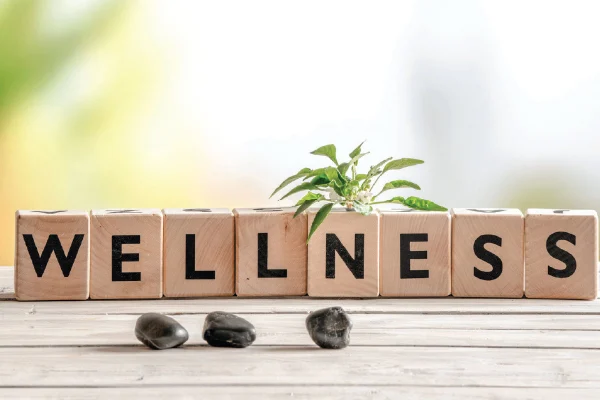Daily wellness isn’t just a trend; it’s a lifestyle that influences how we feel, think, and behave throughout the day. In today’s fast-paced world, many people forget the little things that can significantly impact their health and well-being. Wellness isn’t just about staying healthy; it means maintaining a healthy balance between mind and body. By focusing on daily wellness, people can build a foundation that supports energy, productivity, and long-term health. Understanding the importance of daily wellness empowers us to take control of our lives and live them with more purpose and joy.
The Connection Between Wellness and Mental Balance
Daily wellness habits have a significant impact on mental health. Stress, worry, and constant pressure can influence our thoughts and actions in everyday life. Meditation, writing, or even just a few minutes of focused breathing can calm and rejuvenate the mind. These little things can help you feel better and stay focused. A healthy mindset makes it easier to cope with problems, make choices, and maintain positive relationships. Mental health is just as important as physical health; without a balanced mindset, even your physical health can suffer.
The Role of Physical Activity in Everyday Wellness
Exercise is a crucial aspect of maintaining healthy daily well-being. Regular exercise strengthens the heart, improves flexibility, increases energy, and boosts the immune system. Even a short walk, stretch, or bike ride can significantly improve your overall performance throughout the day. Exercise can also help you sleep better and reduce your risk of long-term illness. Exercise is not only beneficial for your physical health but also releases endorphins, which make you feel better and reduce stress. When you develop a habit of regular exercise, well-being becomes a natural part of your life, not a necessity.
Nutrition is Crucial for Your Health
The food we eat every day has a significant impact on our health. Fruits, vegetables, whole grains, and proteins are all beneficial and provide your body with essential energy and minerals. A balanced diet can help you stay focused, manage your weight, and strengthen your immune system. On the other hand, processed foods, excessive sugar, and unhealthy fats can make you tired and increase your health risks. Carefully choosing foods that nourish your body instead of taxing it can contribute to your daily health. When you prioritize nutrition in your daily routine, your body becomes stronger and can perform optimally.
How Sleep Affects Your Daily Health
Sleep is one of the often overlooked factors when it comes to health. Without enough sleep, your body and mind struggle to function properly. Sleep helps the body repair tissue, balance hormones, and restore energy. It also improves your memory, mood, and concentration. Maintaining a regular sleep schedule and prioritizing quality rest can help you avoid fatigue, stress, or irritability. Many people don’t realize how much better they feel when they get enough sleep every night. When you prioritize rest, your health naturally improves, and it becomes easier to perform daily tasks.
Daily Life and Emotional Well-Being
Emotional well-being is also part of daily health. How we manage stress, communicate with others, and manage our emotions has a tremendous impact on our overall quality of life. Emotional well-being means being able to recognize your feelings, express them healthily, and treat yourself kindly. When you manage your emotions, your relationships improve, you feel more confident, and your life becomes more fulfilling. Simple things like spending time with loved ones, pursuing hobbies, or expressing gratitude can improve your mental health. Taking care of your mental health lays a solid foundation for long-term happiness.
Everyday Wellness and Productivity
Health directly impacts a person’s daily life. When the body is energized, the mind clear, and emotions stable, it’s easier to complete tasks and achieve goals. When you’re not feeling well, you can’t concentrate, which reduces your productivity. People who prioritize their health perform better at work, school, or on personal projects. Therefore, daily well-being isn’t a luxury; it’s a necessity for reaching your highest potential.
Developing Lasting Healthy Habits
The key to daily well-being lies in developing habits that you can maintain long-term. Quick or short-term changes generally don’t work. Instead, small, regular habits like drinking enough water, taking a daily walk, or relaxing can lead to significant changes over time. Well-being isn’t about perfection; it’s about continuous progress and perseverance. Those who view well-being as a lifestyle rather than a short-term goal will see a steady improvement in their health and well-being over time.
Live Longer and Healthier, Every Day
Maintaining good habits every day can also help you live longer. Research indicates that people who maintain healthy daily habits are more likely to live longer and have a better quality of life later in life. Well-being helps prevent long-term illnesses, reduce stress, and maintain your overall physical and mental well-being. The goal isn’t just to extend our lifespan, but to ensure those extra years are filled with vitality and freedom. By integrating well-being into our daily lives now, we invest in a healthier and happier future.
Conclusion
The importance of daily well-being cannot be overstated. You can’t regain your health overnight; you need to continuously care for your body, mind, and emotions. By adhering to regular habits like healthy eating, exercise, getting enough sleep, and taking care of your emotions, people can build a balanced lifestyle that helps them feel positive now and in the future. Our daily well-being influences our feelings, actions, and interactions with others. When you prioritize your health, life becomes more meaningful, productive, and enjoyable.
FAQs
1. Why is daily well-being important?
Well-being is vital for your physical and mental health, energy, productivity, and long-term health.
2. How can I feel better every day?
Start with small efforts to manage stress, such as eating healthy, exercising regularly, getting enough sleep, and staying alert.
3. Is well-being just about physical health?
No, well-being encompasses three types of well-being: physical, mental, and emotional. They are all interconnected and equally important.
4. How does health affect productivity?
When you are healthy and balanced, you can concentrate better, complete tasks faster, and achieve your goals with more energy.
5. Can taking excellent care of yourself every day help you live longer?
Yes, maintaining healthy habits can prevent illness, make you feel better, and ultimately lead to a longer and healthier life.




